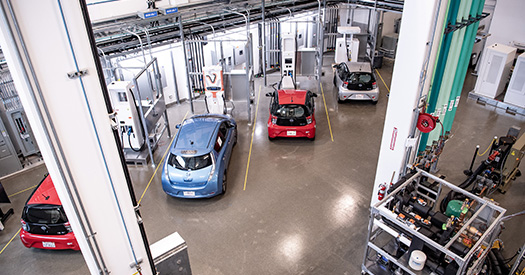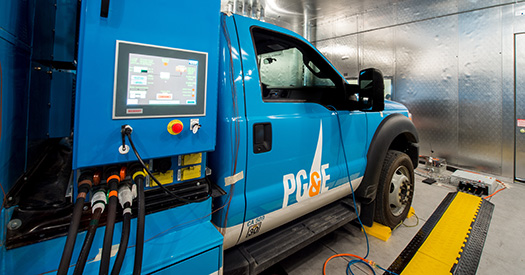Vehicle Thermal Management
NLR collaborates with the automotive industry and fleets to improve thermal management in vehicles through innovative strategies for heating, ventilation, and air conditioning (HVAC); idle reduction; and leveraging waste heat.
Research and Development
NLR's thermal management research helps optimize the thermal performance of conventional and electric-drive vehicles to save money and improve operational efficiencies.
Advanced Thermal System Controls
NLR researchers analyze advanced strategies for thermal system controls. Thermal controls for advanced vehicles, such as electric vehicles, are critical for efficient vehicle operations. By optimizing the use of air conditioning, waste heat, and thermal management for vehicle components, thermal controls can positively impact vehicle range, performance, and reliability while reducing energy and fuel use.
We pioneer integrated thermal systems that streamline and combine vehicle coolant circuits. This integrated approach can reduce the size and weight of cooling systems while increasing their power density and reducing their power consumption, resulting in more efficient and longer-range vehicles.
We perform advanced vehicle battery thermal management analysis and optimization. Our innovative approaches to cooling battery packs can result in improved battery performance, extended battery life, and increased efficiency of HVAC systems.
Our researchers model and demonstrate novel compact heat exchanger configurations to transfer heat efficiently within vehicle systems, enabling higher performance and longer lifetimes for components such as batteries and powertrains.
NLR researchers can model, analyze, and demonstrate a variety of thermal management strategies, including waste heat recovery and heat pumping, to optimize vehicle thermal systems.
Hydrogen fuel cell technologies offer potential solutions for long-range, heavy-duty, and airborne vehicles.
Fuel cells are complex electrochemical reactors that require robust thermal management and air handling to operate with vehicle powertrains' required efficiency, power density, and durability. We investigate integrated fuel cell and cabin thermal management systems and optimize the balance of plant subsystems that support the fuel cell stack, including air, fuel, and thermal management systems. Topology optimization is used to design heat exchangers that capture waste heat to increase plant efficiency, while strictly controlling fuel cell stack temperature and humidity for stack efficiency and durability. Combined, these measures reduce the cost of operating fuel cell systems while enabling long-range vehicle operations.
Optimized HVAC systems can have a significant impact on a vehicle's range and performance. Using research tools such as CoolCalc and FASTSim Hot, we model and analyze strategies for vehicle cabin HVAC management. These strategies consider factors such as cabin insulation, battery sizing, sleeper cab positioning, vehicle paint color, and glass transmissivity on passenger comfort and vehicle performance.
For more information, see Assessing the National Off-Cycle Benefits of 2-Layer HVAC Technology Using Dynamometer Testing and National Simulation Framework, SAE International Technical Paper (2023).
Technology Impact Estimation
Using the laboratory’s extensive vehicle operational data resources and comprehensive modeling frameworks, we can estimate the real-world benefits of improved thermal system performance on a nationally representative basis. We apply representative weather data to simulate models across varied air temperatures, solar conditions, and wind speeds to understand vehicle thermal system performance in realistic environmental conditions. These findings can be used to understand potential national fuel and energy savings created by applying advanced thermal system management technologies.
Applications
NLR’s vehicle thermal management research and applications span light-duty passenger vehicles, heavy-duty vehicles including Class 8 trucks, and off-road and non-road vehicles such as hydrogen-powered and electrified aircraft.
Models, Tools, and Capabilities
NLR's vehicle thermal management modeling tools allow researchers to assess the trade-offs and calculate the potential benefits of thermal design options. These tools include:
Browse Publications
NLR publishes journal articles, conference papers, and reports about vehicle thermal management research.
Contact
Share
Last Updated Dec. 6, 2025



